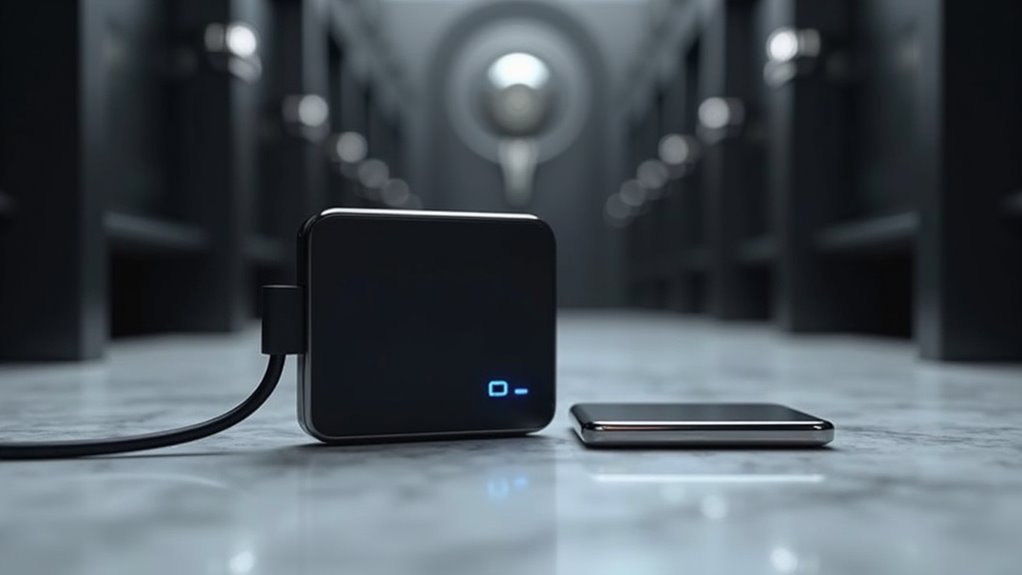Cryptocurrency wallets win the security battle hands down. They give users complete control over their private keys and digital assets, while exchanges act like crypto casinos – convenient but vulnerable to hacks and shutdowns. Hardware wallets offer military-grade encryption and offline storage, making them nearly impossible to breach. Software wallets provide a middle ground. Exchanges? They’re great for trading, terrible for storing. Sure, they’re user-friendly, but so is a Venus flytrap. The deeper story reveals some surprising nuances about both alternatives.

The age-old battle between cryptocurrency wallets and exchanges boils down to a simple truth: control versus convenience. Let’s face it – keeping your crypto on an exchange is like letting someone else hold your precious gold bars. Sure, they might have fancy security systems and insurance, but they’re also massive targets for hackers with dollar signs in their eyes.
Cryptocurrency wallets, particularly those non-custodial ones, put you in the driver’s seat. You’ve got your private keys, complete control, and nobody can freeze your assets or tell you what to do with them. But here’s the kicker – lose those keys, and you might as well kiss your crypto goodbye. Forever. No customer service hotline to save you there. These wallets provide users with full asset control over their cryptocurrency holdings. Instead of storing actual coins, these wallets securely maintain your private key access.
Non-custodial wallets give you total freedom with your crypto, but drop those private keys and it’s game over – permanently.
Exchanges, on the other hand, are like the Vegas casinos of crypto. They’re flashy, convenient, and ready for action 24/7. Want to trade? Click. Want to buy? Click. But they come with strings attached – lots of them. They’ll want your personal information, photo ID, and probably your grandmother’s cookie recipe too. KYC and AML requirements mean kissing your privacy goodbye. Hot wallets offer internet connectivity for quick and frequent transactions.
Hardware wallets are the digital equivalent of stuffing your money under a mattress – if that mattress was equipped with military-grade encryption. They keep your crypto offline and away from grabby hackers. Software wallets offer more convenience but are about as secure as a screen door in a hurricane if your device gets compromised.
The reality is stark: exchanges are convenient but vulnerable. Just ask the countless users who’ve watched their funds vanish in high-profile hacks. Wallets offer security but demand responsibility. Some clever folks split the difference, keeping trading funds on exchanges while storing long-term holdings in wallets. Others use decentralized exchanges, trading directly from their wallets without surrendering control.
Bottom line? Exchanges and wallets each serve their purpose in the crypto system. One offers ease of use, the other promises sovereignty over your digital assets. Choose your poison – but remember, in crypto, you’re either the master of your keys or at someone else’s mercy.
Frequently Asked Questions
Can I Recover My Crypto if I Lose My Hardware Wallet?
Users can recover their cryptocurrency if they lose their hardware wallet by using their recovery phrase (12-24 words) to restore access through compatible wallet software, provided they have securely stored the phrase away from the internet.
How Often Should I Move My Crypto Between Wallets and Exchanges?
Moving cryptocurrency between wallets and exchanges should be limited to necessary trading activities. Keeping most assets in secure wallets while maintaining minimal amounts on exchanges for active trading optimizes both security and functionality.
What Happens to My Crypto if the Exchange Goes Bankrupt?
When an exchange declares bankruptcy, users typically lose immediate access to their crypto. They become unsecured creditors, facing lengthy legal proceedings with limited recovery prospects. Full asset recovery is unlikely in most cases.
Are Multi-Signature Wallets Worth the Extra Security Steps?
Multi-signature wallets are worth the additional security steps for users managing considerable crypto assets or requiring shared control. The enhanced protection against theft and single points of failure outweighs the setup complexity.
Can Government Agencies Freeze Crypto Assets Stored in Wallets?
Government agencies face substantial challenges freezing assets in private wallets due to decentralized control and private key requirements. Nonetheless, they can seize assets through court orders and blockchain intelligence if keys are obtained.









